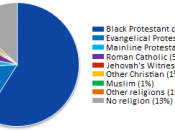The educational failure rate of African-American children is surely one of most pressing issues facing the country. Hopefully, the barrage of media attention the Oakland School Board's resolution has attracted will focus needed attention upon this national tragedy. However, in my opinion, evidence suggests that the notion that Black English is a barrier between these children and standard English is a misidentification.
The fact is that Black English is not different enough from standard English to pose any significant obstacle to speaking, reading, or writing it. Black English is simply a dialect of English, just as standard English is. Any language is actually a bundle of dialects -- varieties which all share a core of vocabulary and structure which make them variations on a single theme, even though they differ from one another in particulars. Southern English, Appalachian English, Brooklyn English, and standard English itself are all dialects of English.
Of course, the boundary between dialect and language is not a stark one. Sometimes a variety can diverge so far from the common core of a language X that it becomes impossible to say whether it is a dialect of X or a new language Y. One useful indication of this is when the variety is no longer mutually intelligible with other dialects of X, although this can also happen when varieties remain closely related. There are also cases where geopolitics obscures linguistic reality: Swedish, Norwegian and Danish are really dialects of a single language "Scandinavian", but are considered separate languages because they are spoken in separate countries. Meanwhile, the "dialects" of Chinese, like Mandarin and Cantonese, are actually separate, mutually unintelligible languages, but since they share a writing system and a culture are treated as "dialects".
However, none of this means that there is any "debate" among linguists...


